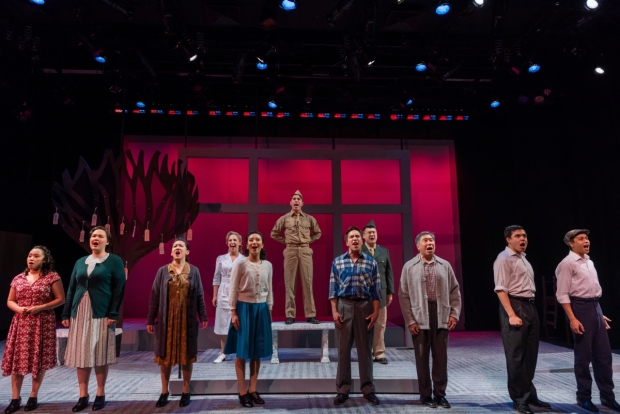A Family's History Plays Out in Allegiance
The musical explores the US government’s shocking internment of Japanese Americans during World War II.

(© Nile Scott Studios)
One of America's most shocking instances of civil rights abuses in the past century is the forced incarceration of 117,000 persons of Japanese descent during World War II. Reacting to the attack on Pearl Harbor, President Franklin D. Roosevelt ordered Japanese Americans to be relocated to the interior of the country and kept behind barbed wire, to insure against the threat of espionage and supposedly to protect them from angry citizens at home. It was not until 1988 that Congress moved to acknowledge the injustice, followed by President Ronald Reagan's apology.
The actor George Takei (Star Trek) and his family were among those given six days' notice to leave their homes and economic support in order to be transported to desolate camps until the end of the war. The musical Allegiance, which is based on his family's experience, premiered in San Diego in 2012 and opened on Broadway in 2015, with Takei making his Broadway debut in the show. The stripped-down SpeakEasy Stage production — directed by Paul Daigneault, with music direction by Matthew Stern and choreography by Ilyse Robbins — marks the East Coast regional premiere of the show.
The creators of Allegiance (book by Marc Acito, Jay Kuo, and Lorenzo Thione; music and lyrics by Kuo) personify the victims of the government decision in the members of the fictitious Kimura family: father Tatsuo (Ron Domingo), son Sammy (Sam Tanabe), daughter Kei (Grace Yoo), and grandfather Ojii-chan (Gary Thomas Ng, who also plays Sammy as an old man). Their lives during the years 1941-45 are bookended by flash-forward excerpts set in 2001.
Before the attack, the family lived on their farm in Salinas, California. Sammy has just graduated from college, and Kei has helped raise him since their mother died during childbirth. After Pearl Harbor and the President's edict, the family is forced to evacuate to Heart Mountain Relocation Center, located in Wyoming, where they live in communal housing with no running water or private kitchens.
To prove his patriotism, Sammy joins the fabled 442nd Regiment Combat Team, composed of Japanese Americans who were sent on the most dangerous missions. In contrast, Frankie Suzuki (Tyler Simahk), who becomes Kei's lover, resists reporting for the draft, instead demanding that the Japanese Americans be freed from the camps. Sammy's love interest, Hannah Campbell (Melissa Geerlof), the Quaker nurse at the camp, tries to treat Frankie's injuries before he is jailed for refusing to fight.
While the characters as written tend to be generic and sometimes based on clichés (especially the evil, pistol-toting American soldier played by Ryan Mardesich), the actors endow them with a depth of feeling and dignity. As Kei, Yoo is the standout of the cast, with a stunning soprano voice, especially evident in her anguished solo, "Higher." Domingo offers a restrained but eloquent portrait of a father who cannot express himself; Ng plays the grandfather as the most sympathetic person onstage. Tanabe, as Sammy, is given the most difficult role of proudly proclaiming his patriotism, but his performance ends up being less inspiring than Simahk's as the rebel who stays true to his beliefs.
The songs are generally forgettable, and several of the too-cheery numbers are out-of-sync with the general dark tone of the show, although the five-piece orchestra at the side of the stage, led by Stern on keyboards, delivers a fine rendering of the Asian-influenced score. Eric Levenson's sparse setting of a revolving center stage, relieved only by several props, suggests the bleak landscape where the camp is located.
Although Allegiance does not successfully bridge the divide between the emotional impact of the material and the generally upbeat expectations of musical theater, this production, currently running at the Calderwood Pavilion, Boston Center for the Arts, presents a moving evening of memories that offer almost too many parallels to our times.








